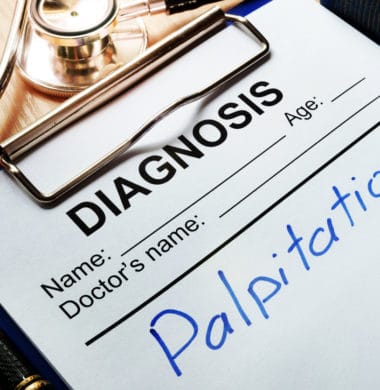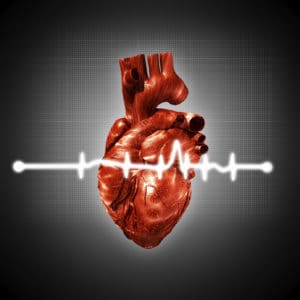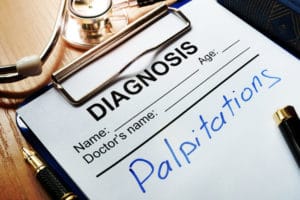Can Dieting Cause Heart Palpitations?

The COVID-19 pandemic has impacted our lives in a variety of ways. For many people, it has meant putting their gym membership on indefinite hold. If you’re unable to find alternative ways to maintain an active lifestyle, it can result in significant weight gain. In fact, many people have experienced this problem during the pandemic.
Fad diets are not a new phenomenon, but they are likely to be used with increasing frequency during the pandemic as people struggle with weight gain from decreased activity levels. There are many reasons to be wary of fad diets, including a negative impact on your heart health. Many diets have been linked to heart palpitations.
What Are Heart Palpitations?

Heart Palpitations
Heart palpitations are very common and, in most instances, they aren’t cause for alarm. However, there is always a chance that these palpitations are a sign of a more serious heart condition. Due to the uncertainty surrounding their severity, it’s preferable to avoid actions that may trigger heart palpitations.
You may experience one or more of the following symptoms from heart palpitations:
- A fluttering sensation in your chest
- A pounding or throbbing that feels like your heart is beating too hard
- A racing heartbeat
- A sensation of your heart skipping a beat
Fad diets can often trigger heart palpitations. While there are many other potential causes of the condition, you may want to discontinue your fad diet to see if your palpitations go away. This can be helpful in identifying whether the condition should be cause for alarm.
Why Do Heart Palpitations Occur While Dieting?
There are several ways in which your diet may contribute to heart palpitations:
- Increased levels of caffeine consumption – If you’re taking diet pills to lose weight, you’re most likely receiving a super-charged dose of caffeine, which can trigger heart palpitations. This is due to the fact that stimulants such as caffeine often increase your heart rate. If you are particularly sensitive to the effects of caffeine, it’s best to avoid diet pills.
- Dehydration – Many fad diets result in serious dehydration. This can create electrolyte imbalances in your body, especially if your diet restricts your caloric intake to less than 800 calories per day. Many detox diets can deplete your electrolytes as well due to diuretic effects.
- Low blood sugar – Limiting your caloric intake can lower your blood sugar levels, which can trigger heart palpitations. This is especially common in individuals with a history of anemia, heart disease or hyperthyroidism. In addition, diabetics are prone to wild fluctuations in blood sugar levels, increasing the likelihood of palpitations from a fad diet.
- Mineral deficiencies – This is especially common in diets that severely restrict your carbohydrate intake. Eliminating carbs will decrease your insulin production. This can make it challenging for your body to regulate the levels of sodium, magnesium, and potassium in your system.
Preventing Diet-Related Heart Palpitations

Heart Palpitations
The most effective way to eliminate the risk of diet-related heart palpitations is to discontinue your fad diet. Instead of relying on a method that will result in rapid weight loss that may be hard to sustain, you’re better off making adjustments to your diet that will be sustainable over the long haul. This should include:
- Lots of fruits and vegetables
- Moderate levels of protein
- Whole grains
- Limited amounts of processed foods and items high in sugar or unhealthy fats
If you’re committed to your fad diet, the following tips can help reduce your risk of heart palpitations:
- Drink salted water to restore proper hydration and electrolyte levels
- Consume magnesium- and potassium-rich vegetables to ensure a sufficient supply of these important minerals
- Take a supplement containing essential minerals and electrolytes
South Denver Cardiology Associates Can Help
If you’re experiencing heart palpitations on a regular basis, it’s important to determine the cause of the problem. While this condition is benign in many situations, such as when it is caused by dieting, there are other times when action is required to prevent more serious heart issues down the road. At South Denver Cardiology Associates, our team of cardiologists can help you understand the reason behind your palpitations and whether any changes to your lifestyle are needed.
Our diagnostic center uses the latest and most advanced technology to ensure highly accurate results. If our cardiologists determine that your diet is causing heart palpitations, we may recommend adjustments that will alleviate this condition. If we believe it is a sign of a more serious problem, our heart doctors will work with you to develop a treatment plan that will help restore optimal heart health.
Schedule an Appointment
Please contact South Denver Cardiology Associates today to schedule an appointment. We serve patients in Denver, Littleton, and the surrounding areas of Colorado.
- 9 Tips to Reduce Holiday Stress - December 11, 2025
- 6 Tips for Exercising Outdoors with a Heart Condition - May 19, 2025
- Lifestyle Changes That Can Help Manage Arrhythmia - April 30, 2025
Sign Up
As with any health concerns, your specific treatment program should be discussed thoroughly with your primary care physician as well as any specialists who may need to be consulted – like a cardiologist.
Sign Up
